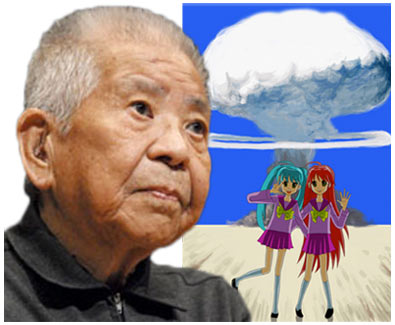One of the more amazing stories of World War II is that of Tsutomu Yamaguchi, the man who survived not one but two atomic bombings. Tsutomu was an engineer with Mitsubishi Heavy Industries on a business trip in Hiroshima when the American atomic bomb exploded at 8:15 am on August 6, 1945. He was badly burned in the explosion and, not knowing what else to do, he returned to his home in…wait for it…Nagasaki. Though still in pain from his injuries, he showed up for work on August 9 only to have the second atomic bomb dropped a mere 3 km from where he was. Recently a BBC show called “QI” got in hot soup when it seemed to make fun of Mr. Yamaguchi’s unique experience, saying “this man is either the unluckiest or the luckiest, depends on which way you look at it” while the audience chuckled at jokes a panel of comedians made. This caused a minor uproar in Japan which resulted in an official protest from the Japanese Embassy and an apology from the show’s host, Stephen Fry.
This episode teaches us several things, including that Japan is extremely sensitive to the subject of the atomic bombings and that Britain’s famous ironic humor is forever lost on the Japanese. By all accounts, the QI show was respectful to Mr. Yamaguchi, truly in awe at what he’d lived through, and much of the humor had to do with amazement that the trains in Hiroshima were still operating despite the bombing, which would presumably not be the case in Britain. Being the only country that has experienced atomic bombings has affected Japan in ways that are naturally difficult for Westerners to contemplate. While there have been periods when the Japanese shunned the memory of the bombings as too painful to remember, at the same time Japan’s pop culture has embraced the atomic bombings in strange ways. Astro Boy’s Japanese name is Atom and his sister is Uran (Uranium), millions of Japanese believe the iconic “Lucky Strike” logo is the Hiroshima mushroom cloud seen from above (it’s not), and then there’s all that strange moe fan art involving mushroom clouds, which you can find on the Internet. When Nagasaki-born “talent” Masaharu Fukuyama came out on on his radio program as a “third generation atomic bombing victim” it caused quite a stir — no one talked about such things.
(Incidentally, while Mr. Yamaguchi is the only officially registered double atomic bombing victim, there are more than 100 people thought to have been affected by both attacks. However, as data was not collected on these individuals it’s nearly impossible to know for sure.)

A minor dust-up between the BBC and Japan over an amazing man.















